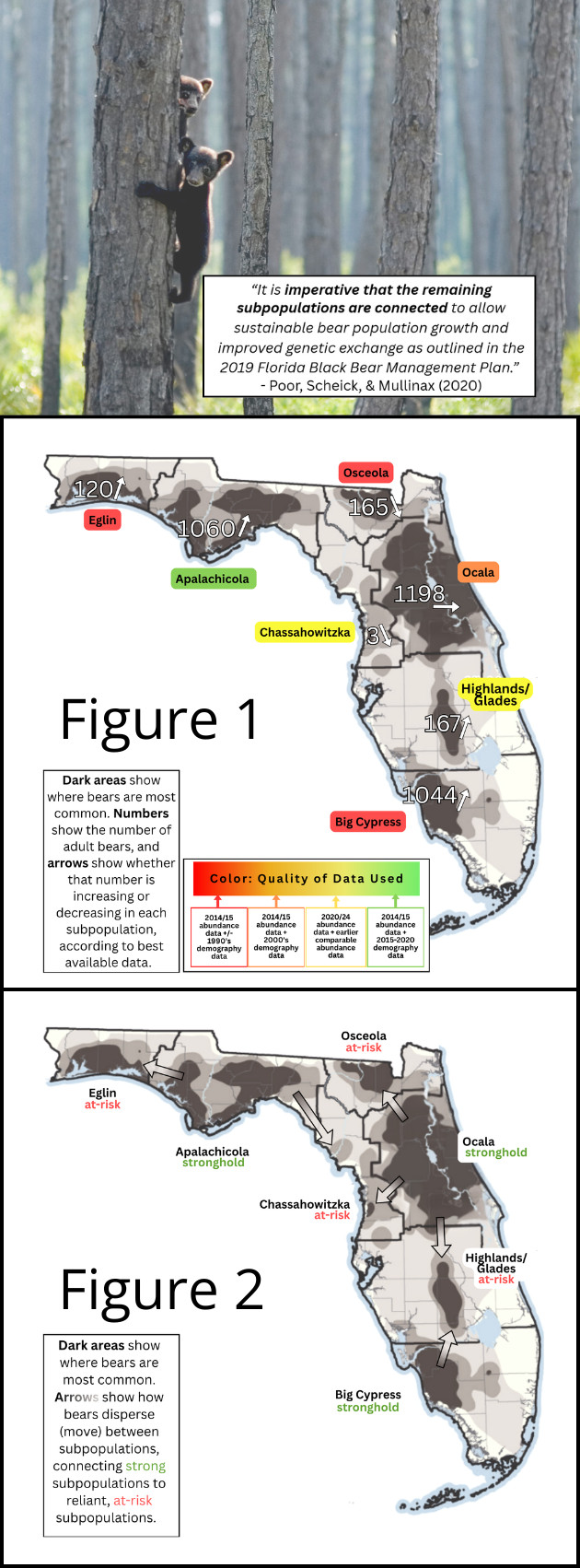
We, the undersigned scientists and conservationists with expertise in black bear and related wildlife ecology, write to express our professional concern regarding the scientific and conservation basis of the Florida Fish and Wildlife Conservation Commission (FWC)’s proposal to reopen a Florida black bear hunt in 4 of Florida’s 7 subpopulations.
In our assessment, the proposed hunt is not adequately supported by relevant, up-to-date science (Figure 1), nor does it address a bear management issue. It also conflicts with several guiding principles of the North American Model of Wildlife Conservation and the primary objectives of FWC’s Florida Black Bear Management Plan (“Bear Plan”).
For example, the agency misinterprets the Bear Plan’s 200‑bear “minimum abundance objective” as a trigger for sustainable harvest rather than as a minimum viability safeguard. The 200-bear per subpopulation objective is a science-based minimum number required to maintain genetic diversity and viability.
Furthermore, one subpopulation (Osceola) is below this threshold and evidently declining, but the FWC is ignoring its only harvest restriction (200 bears) to allow harvest in the subpopulation. The harvest of an at-risk subpopulation will directly and irreparably harm the resource, eventually leading to the total loss of bears in that region.
Without adequate scientific modeling, even the harvest of large subpopulations (e.g., Ocala) could irreparably harm at-risk subpopulations by reducing density and dispersal pressure in large subpopulations, thereby eliminating the only source of dispersing bears for the State. Small, at-risk subpopulations, still in recovery stages, rely on bear dispersal for continued recovery (Figure 2).
We propose that the FWC:
Give staff scientists adequate time to complete relevant research that is currently underway (results expected 2029), so that forthcoming population management proposals are based on up-to-date, best available science;
Refrain from harvesting declining subpopulations, as this conflicts with the sustainability clause in rule 68A-12.012 Regulations Governing Bear Hunting;
Review its harvest proposal for agreement with its Bear Plan, specifically Objectives 1 & 2 regarding statewide connectivity via dispersal and increasing all subpopulations to exceed, not meet, 200 adult bears;
Investigate via modeling the effect of reducing or stabilizing bear numbers in large subpopulations on the statewide, connected metapopulation;
Review the principles of the North American Model of Wildlife Conservation for guidance on democratic rule of law, legitimate purpose, and scientific management; and,
Allocate any bear harvest revenue to bear-safe trash cans and/or to bear habitat rather than to a general conservation fund, so that the statewide bear population and other wildlife may experience a net benefit from any future harvest.
From our ecological perspective, the Florida bear population should not be subject to harvest until relevant data are fully incorporated, statewide connectivity effects are evaluated, and a clearly defined management purpose is articulated and supported by the public. Failure to do so is reckless in that it risks harm not only to multiple small, interdependent subpopulations, which the FWC has spent decades recovering, but also in that it risks eroding public trust in the State’s essential wildlife governance.
We sign as individuals, not as representatives of our Institutions. Any Institutions listed are for identification purposes only.
- Daniel Parker, Biologist, Media Director, USARK FL, DRMP, Webster
- Bobbie Lee Davenport, Financial planning, ECOSWF, Naples
- Amanda Perez, Teacher, Urban Paradise Guild, Miami
- anonymous
- anonymous
- Alexander Sherer, PhD Student, University of Miami, Miami
- Adam Steckley, Executive Director, Blue Scholars Initiative, Miami
- Michael Schoenfeld, teacher, Lake Worth
- Kaatje Bernabei, Trip leader, Sierra Club Miami group, Miami
- Michelle Lute, PhD, Conservation Scientist, Wildlife for All, Pena Blanca
- Melinda Marquis, Ph.D., Science for Colorado Wildlife, Nederland, CO
- Will Stolzenburg, wildlife journalist, Reno
- Adrian Treves, PhD, scientist, Carnivore Coexistence Lab, Madison
- Sean M. McHugh, Wildlife Biologist, Everglades
- deborah slicer PhD, professor, Missoula
- Miguel Silva, PhD Student, Wildlife Biologist, Michigan State University
- Stephanie M Myers, retired, na, Las Vegas
- John W. Grandy IV, PhD, Ecologist, Pegasus Foundation, Bethany Beach, De
- Christopher Boykin, Nonprofit, Miami Waterkeeper, Miami
- Janet m osborne, Veterinary Technician, WINDERMERE
- R. and A. Johns, property manager, Sarasota
- F. & E. Voltz, Nevada
- anonymous
- Betsy McClain, na, Longwood
- Eleyna Maldonado, Environmental Consultant, Core Environmental Solutions, West Covina, CA
- Julia Archer, retired, Colorado Wildlife Alliance volunteer, Colorado Springs
and sign it together